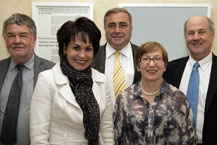Latest News Archive
Please select Category, Year, and then Month to display items
12 January 2024
|
Story Nonsindiswe Qwabe
|
Photo Sonia Small
 Since joining the UFS in 2008, Dr Grey Magaiza has worked extensively on approaches that can foster the socio-economic transformation of societies.
Since joining the UFS in 2008, Dr Grey Magaiza has worked extensively on approaches that can foster the socio-economic transformation of societies.
“The future should be one where communities can decide on their development agenda and futures. That’s the most important for me.” Dr Grey Magaiza, Deputy Director of the Centre for Gender and Africa Studies (CGAS) and Head of the Community Development programme on the Qwaqwa Campus, is passionate about capacitating communities to be agents of change and advancement. His vision for the future emphasises the empowerment of communities to take charge of their development by actively participating in decision making and the implementation of development projects that can improve their lives.
Since joining the UFS in 2008, Dr Magaiza has worked extensively on approaches that can foster the socio-economic transformation of societies. Over the years, he has crafted his research speciality into one that he is most proud of – being an interdisciplinary scientist immersed in the development of communities.
“I’m in a fortunate position of researching what I like. I say ‘fortunate’, because I’ve taken the time to understand what I’m passionate about, which is the overall field of rural livelihoods and livelihood futures – in short, community development. My research starts from an engaged university, understanding the elements that a university must use to enhance transformation and relevance to its immediate community in terms of development.”
One of the ways he has done this is by looking at social entrepreneurship as a development approach for young people in a rural setting. Through workshops with non-profit and civic organisations in Qwaqwa, Dr Magaiza has been helping these organisations to map out their needs and actively meet them through the involvement and support of external role players.
“We understand that communities are part of the national development agenda, but even that national agenda respects community knowledge and intentions and allows communities to shape their identity. A critical enabler of this is community organising. You bring back the capacity in communities to have dialogues on issues affecting them as spaces for engagement, knowledge exchange, and for people to just talk about their way forward.”
By enabling communities to define their development agenda, they can address their specific needs, challenges, and aspirations, he said. “When I look at livelihood futures, it’s quite an exciting aspect of my work – it’s like looking into a fortune tellers’ globe, because you’re not deciding for communities what they should do, but the communities themselves take those decisions.”
Good practice discussed during workshop of the ACU Benchmarking Programme
2012-09-10
 |
|
From the left are: Prof. John Brennan, assessor from the Open University in the UK; Prof. Driekie Hay, Vice-Rector: Academic, UFS; Mr Cliff Wragg, ACU Benchmarking Programme Manager; Prof. Ellen Hazelkorn, assessor from Dublin Institute of Technology in Ireland; and Mr Mike Gallagher, Executive Director of Go8 in Australia.
Photo: Johan Roux
10 September 2012
|
The ACU University Management Benchmarking Programme presented a workshop on the Bloemfontein Campus of the University of the Free State (UFS) from 27 to 29 August 2012.
The programme offers a unique and cost-effective opportunity for participating universities to compare their key management processes with those in a range of other universities. This helps to identify areas for change and assists in setting targets for improvement and identifying techniques for managing change. The outcomes of the programme provide models of good practice. It creates the opportunity for networking and a workshop, guided by internationally acknowledged subject experts. This year representatives from universities in among others Australia, the South Pacific, Canada, the United Kingdom (UK) and South Africa attended the workshop. The topics discussed were financial management, managing league tables and ranking and managing graduate outcomes.